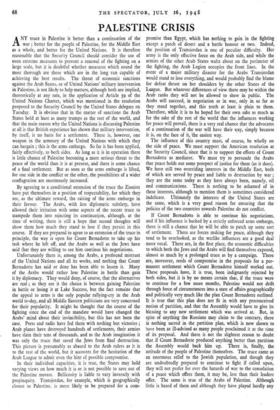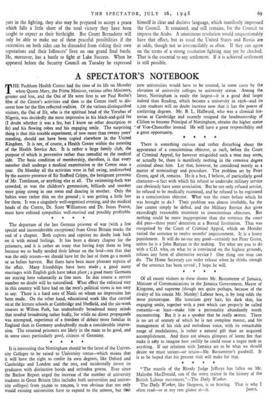PALESTINE CRISIS
ANY truce in Palestine is better than a continuation of the war ; better for the people of Palestine, for the Middle East as a whole, and better for the United Nations. It is therefore reasonable that the Security Council should consider the use of even extreme measures to prevent a renewal of the fighting on a large scale, but it is doubtful whether measures which sound the most thorough are those which are in the long run capable of achieving the best results. The threat of economic sanctions against the Arab States, or of United Nations' military intervention in Palestine, is not likely to help matters, although both are implied, theoretically at any rate, in the application of Article 39 of the United Nations Charter, which was mentioned in the resolution proposed to the Security Council by the United States delegate on Tuesday. It is obvious that in the matter of sanctions the Arab States hold at least as many trumps as the rest of the world, and that the main reason why the United Nations is discussing Palestine at all is that British experience has shown that military intervention, by itself, is no basis for a settlement. There is, however, one weapon in the armoury of the United Nations with which they can bargain ; this is the arms embargo. So far it has been applied, fairly effectively, to both sides. As long as it is in operation there is little chance of Palestine becoming a more serious threat to the peace of the world than it is at present, and there is some chance of a final settlement. But as soon as the arms embargo is lifted, for one side in the conflict or the other, the possibilities of a wider conflagration are enormously increased.
By agreeing to a conditional extension of the truce the Zionists have put themselves in a position of respectability, for which they see, as the ultimate reward, the raising of the arms embargo in their favour. The Arabs, with less diplomatic subtlety, have allowed their irritation with some aspects of the recent truce to stampede them into rejecting its continuation, although, at the time of writing, there is still a hope that second thoughts will show them how much they stand to lose if they persist in this course. If they are prepared to agree to an extension of the truce in principle, the way is open for Count Bernadotte to take up his task where he left off, and the Arabs as well as the Jews have said that they are willing to see him continue his negotiations.
Unfortunately there is, among the Arabs, a profound mistrust of the United Nations and all its works, and nothing that Count Bernadotte has said or done has been able to lessen it. Many of the Arabs would rather lose Palestine in battle than gain it by diplomacy. They would deny, of course, that the alternatives are real ; as they see it the choice is between gaining Palestine in battle or losing it at Lake Success, but the fact remains that the appeal to arms is the only popular rallying-cry in the Arab world to-day, and all Middle Eastern politicians are very concerned for their popularity. It might be thought that the course of the fighting since the end of the mandate would have changed the Arabs' mind about their invincibility, but this has not been the case. Press and radio have fed them with nothing but victories ; Arab planes have destroyed hundreds of settlements, their armies have slain their tens of thousands, and to the Arab imagination it was only the truce that saved the Jews from final destruction. This picture is presumably as absurd to the Arab rulers as it is to the rest of the world, but it accounts for the hesitation of the Arab League to admit even the hint of possible compromise.
In their individual capacities, it is true, the States may hold varying views on how much it is or is not possible to save out of the Palestine morass. Bellicosity is liable to vary inversely with propinquity. Transjordan, for example, which is geographically closest to Palestine, is more likely to be prepared for a com- promise than Egypt, which has nothing to gain in the fighting except a patch of desert and a battle honour or two. Indeed, the position of Transjordan is one of peculiar difficulty. Her army is the only effective force on the Arab side, and while the armies of the other Arab States waltz about on the perimeter of the fighting, the Arab Legion occupies the front lines. In the event of a major military disaster for the Arabs Transjordan would stand to lose everything, and would probably find the blame for defeat thrust on her shoulders by the other States of the League. But whatever differences of view there may be within the Arab ranks they will not be allowed to show in public. The Arabs will succeed, in negotiation or in war, only in so far as they stand together, and this truth at least is plain to them. Therefore, while it is to be hoped for their own sake as much as for the sake of the rest of the world that the influences working for peace will prevail, there is a very real chance that the advocates of a continuation of the war will have their way, simply because it is, on the face of it, the easiest way.
The influence of this country must, of course, be wholly on the side of peace. We must support the American resolution at the Security Council, since that is to support the efforts of Count Bernadotte as mediator. We must try to persuade the Arabs that peace holds out some prospect of justice for them (as it does). We have still two overriding interests in the Middle East, both of which are served by peace and liable to destruction by war ; they are the same today as they have always been, namely, oil and communications. There is nothing to be ashamed of in these interests, although to mention them is sometimes considered indelicate. Ultimately the interests of the United States are the same, which is a very good reason for ensuring that the policies of the two countries towards Palestine do not conflict.
If Count Bernadotte is able to continue his negotiations, and if his influence is backed by a strictly enforced arms embargo, there is still a chance that he will be able to patch up some sort of settlement. There are forces making for peace, although they tend to be overlooked, as the warlike influences are a good deal more vocal. There are, in the first place, the economic difficulties to which both the Jews and the Arabs will find themselves exposed, almost as much by a prolonged truce as by a campaign. There are, moreover, seeds of compromise in the proposals for a per- manent settlement which Count Bernadotte himself worked out. These proposals have, it is true, been indignantly rejected by both sides, but it is by no means certain that, if the truce were to continue for a few more months, Palestine would not drift through force of circumstances into a state of affairs geographically and politically very much like the plan Count Bernadotte outlined. It is true that this plan does not fit in with any preconceived notion of partition, and that the Assembly would have to give its blessing to any new settlement which was arrived at. But, in spite of anything the Russians may claim to the contrary, there is nothing sacred in the partition plan, which is now shown to have been as ill-advised as many people proclaimed it at the time of its proposal. And there is not the slightest reason to doubt that if Count Bernadotte produced anything better than partition the Assembly would back him up. There is, finally, the attitude of the people of Palestine themselves. The truce came as an enormous relief to the Jewish population, and though they are undoubtedly prepared to continue to fight if called upon, they will not prefer for ever the hazards of war to the consolation of a peace which offers them, it may be, less than their leaders offer. The same is true of the Arabs of Palestine. Although little is heard of them and although they have played hardly any part in the fighting, they also may be prepared to accept a peace which falls a little short of the total victory they have been taught to expect as their birthright. But Count Bernadotte will only be able to make use of these peaceful possibilities if the extremists on both sides can be dissuaded from risking their own reputations and their followers' lives on one grand final battle. He, moreover, has a battle to fight at Lake Success. When he appeared before the Security Council on Tuesday he expressed himself in clear and decisive language, which manifestly impressed the Council. It remained, and still remains, for the Council to impress the Arabs. A unanimous resolution would unquestionably have that effect, but as usual the United States and Russia are at odds, though not so irreconcilably as often. If they can agree on the terms of a strong resolution fighting may yet be checked. That is the essential to any settlement. If it is achieved settlement is still possible.



































 Previous page
Previous page